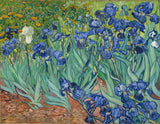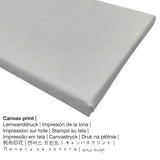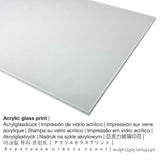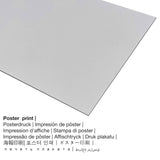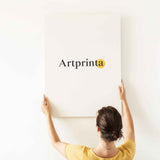Vincent van Gogh, 1889 - Irises - fine art print
Tax included. Shipping calculated at checkout.
The painting with the title "Irises" as your art print
The painting named "Irises" was made by Vincent van Gogh. The 130 year old masterpiece had the size: 74,3 x 94,3 cm and was painted with the technique oil on canvas. Today, this piece of art belongs to the digital collection of The J. Paul Getty Museum. With courtesy of The J. Paul Getty Museum (licensed - public domain).Creditline of the artwork: . The alignment is in landscape format and has a side ratio of 4 : 3, which implies that the length is 33% longer than the width. The painter, botanical illustrator, printmaker, drawer Vincent van Gogh was an artist from the Netherlands, whose art style was primarily Post-Impressionism. The Dutch artist lived for a total of 37 years, born in the year 1853 in Zundert, North Brabant, Netherlands and deceased in the year 1890.
Get your favorite product material
For every fine art print we offer different sizes & materials. You can choose among the following product customization options:
- The poster print on canvas material: A poster is a UV printed canvas with a slightly rough finish on the surface. A poster print is used for framing your fine art print in a customized frame. Please bear in mind, that depending on the size of the poster print we add a white margin between 2 - 6cm around the print motif in order to facilitate the framing with your custom frame.
- Acrylic glass print (with real glass coating): The acrylic glass print, often described as a print on plexiglass, will change the artwork into brilliant home décor and offers a great alternative option to canvas or dibond art prints. Your own replica of the artwork is being custom-made with state-of-the-art UV direct printing machines. The result of this are intense, sharp colors. The major benefit of an acrylic glass fine art copy is that sharp contrasts and also smaller details will be more identifiable thanks to the delicate tonal gradation of the picture. Our real glass coating protects your selected art print against light and heat for decades.
- Aluminium print (aluminium dibond): These are metal prints on alu dibond with a true depth. For the Aluminium Dibond print, we print the chosen artwork on the surface of the aluminum. The bright & white parts of the original artpiece shine with a silk gloss but without any glow.
- Canvas print: A printed canvas material applied on a wood stretcher frame. Hanging your canvas print: Canvas Prints have the great advantage of being low in weight. That means, it is easy to hang up the Canvas print without additional wall-mounts. Therefore, a canvas print is suited for any type of wall.
Important legal note: We try our best to depict our art products as precisely as possible and to showcase them visually. However, the colors of the print materials and the printing can vary slightly from the image on the monitor. Depending on the screen settings and the condition of the surface, not all color pigments are printed as exactly as the digital version. Bearing in mind that all our are printed and processed by hand, there may as well be minor variations in the size and exact position of the motif.
The product
| Article categorization: | fine art reproduction |
| Method of reproduction: | reproduction in digital format |
| Manufacturing method: | UV direct print (digital printing) |
| Product Origin: | German production |
| Type of stock: | on demand production |
| Intended product use: | art print gallery, wall décor |
| Alignment: | landscape format |
| Side ratio: | 4 : 3 |
| Aspect ratio implication: | the length is 33% longer than the width |
| Materials you can choose from: | poster print (canvas paper), acrylic glass print (with real glass coating), canvas print, metal print (aluminium dibond) |
| Canvas on stretcher frame (canvas print) size variants: | 40x30cm - 16x12", 80x60cm - 31x24", 120x90cm - 47x35", 160x120cm - 63x47" |
| Acrylic glass print (with real glass coating) options: | 40x30cm - 16x12", 80x60cm - 31x24", 120x90cm - 47x35", 160x120cm - 63x47" |
| Poster print (canvas paper): | 40x30cm - 16x12", 80x60cm - 31x24", 120x90cm - 47x35" |
| Aluminium print (aluminium dibond material) size variants: | 40x30cm - 16x12", 80x60cm - 31x24", 120x90cm - 47x35" |
| Picture frame: | unframed reproduction |
Details about the original artwork
| Title of the painting: | "Irises" |
| Categorization of the artpiece: | painting |
| General category: | modern art |
| Time: | 19th century |
| Artwork year: | 1889 |
| Age of artwork: | more than 130 years old |
| Original medium: | oil on canvas |
| Original artwork size: | 74,3 x 94,3 cm |
| Exhibited in: | The J. Paul Getty Museum |
| Museum location: | Los Angeles, California, United States of America |
| Available under: | The J. Paul Getty Museum |
| License: | public domain |
| Courtesy of: | The J. Paul Getty Museum |
Artist overview table
| Artist name: | Vincent van Gogh |
| Aliases: | Fan'gao, Van-Gog Vint︠s︡ent, Fan-ku, van gogh, van Gogh Vincent, גוג וינסנט ואן, Gogh Vincent Willem van, 梵高, Gogh Vincent-Willem van, ビンセントゴッホ, ゴッホ, Gogh, גוך וינסנט ואן, Fan-kao, v. van gogh, j. van gogh, Vincent van Gogh, Gogh Vincent van, Fangu Wensheng, Fangu |
| Artist gender: | male |
| Nationality: | Dutch |
| Professions: | drawer, painter, botanical illustrator, printmaker |
| Country: | the Netherlands |
| Artist category: | modern artist |
| Styles of the artist: | Post-Impressionism |
| Age at death: | 37 years |
| Birth year: | 1853 |
| Born in (place): | Zundert, North Brabant, Netherlands |
| Year of death: | 1890 |
| Town of death: | Auvers-sur-Oise, Ile-de-France, France |
© Copyright protected - www.artprinta.com (Artprinta)
(© Copyright - The J. Paul Getty Museum - www.getty.edu)
In May 1889, after episodes of self-mutilation and hospitalization, Vincent van Gogh chose to enter an asylum in Saint-Rémy, France. There, in the last year before his death, he created almost 130 paintings. Within the first week, he began Irises, working from nature in the asylum's garden. The cropped composition, divided into broad areas of vivid color with monumental irises overflowing its borders, was probably influenced by the decorative patterning of Japanese woodblock prints.
There are no known drawings for this painting; Van Gogh himself considered it a study. His brother Theo quickly recognized its quality and submitted it to the Salon des Indépendants in September 1889, writing Vincent of the exhibition: "[It] strikes the eye from afar. It is a beautiful study full of air and life."
Each one of Van Gogh's irises is unique. He carefully studied their movements and shapes to create a variety of curved silhouettes bounded by wavy, twisting, and curling lines. The painting's first owner, French art critic Octave Mirbeau, one of Van Gogh's earliest supporters, wrote: "How well he has understood the exquisite nature of flowers!"

